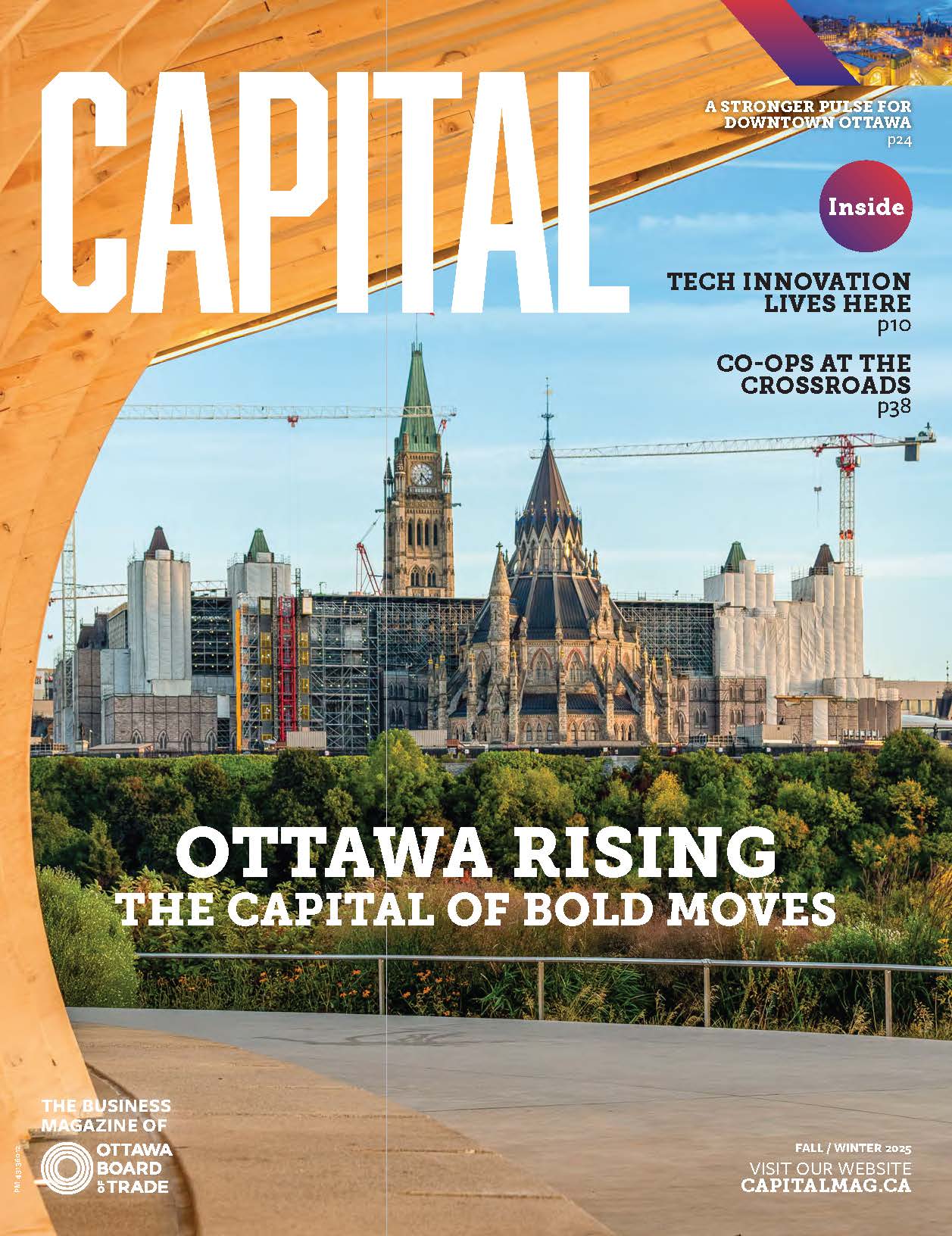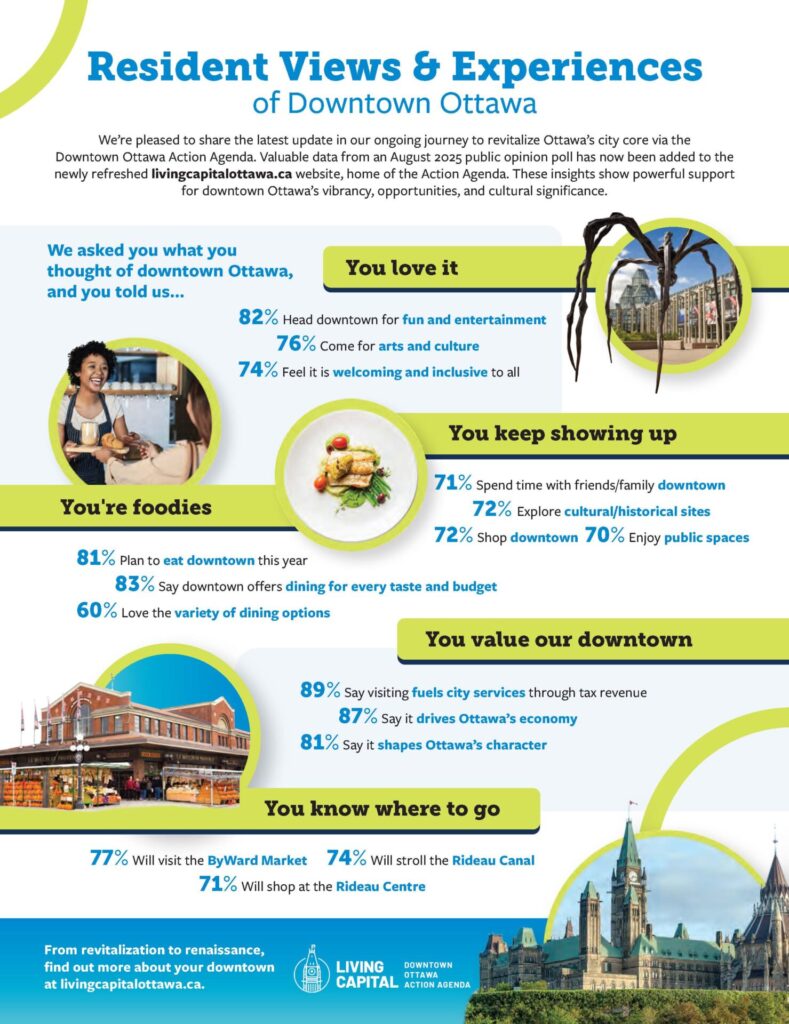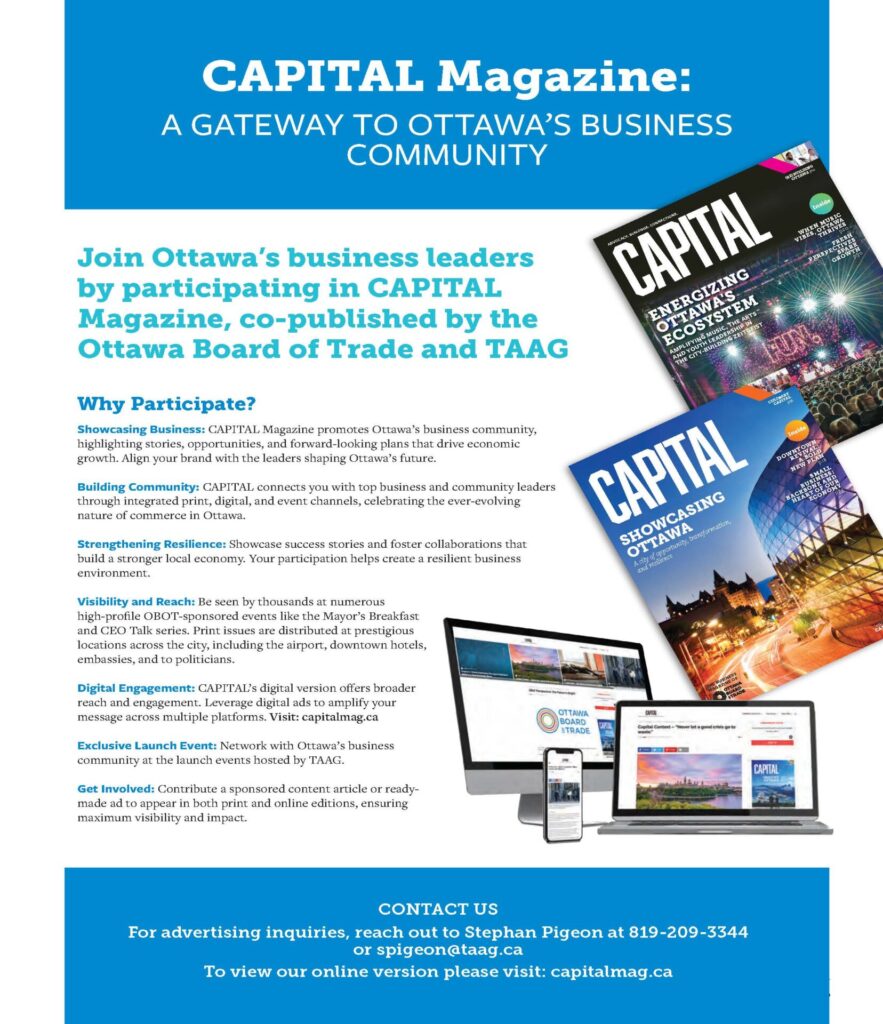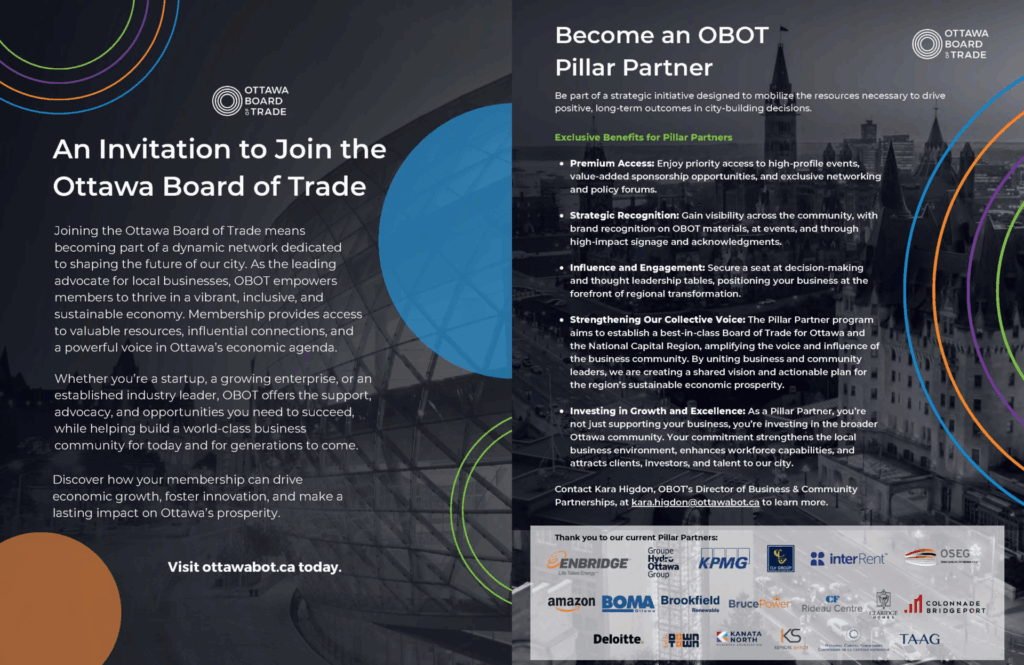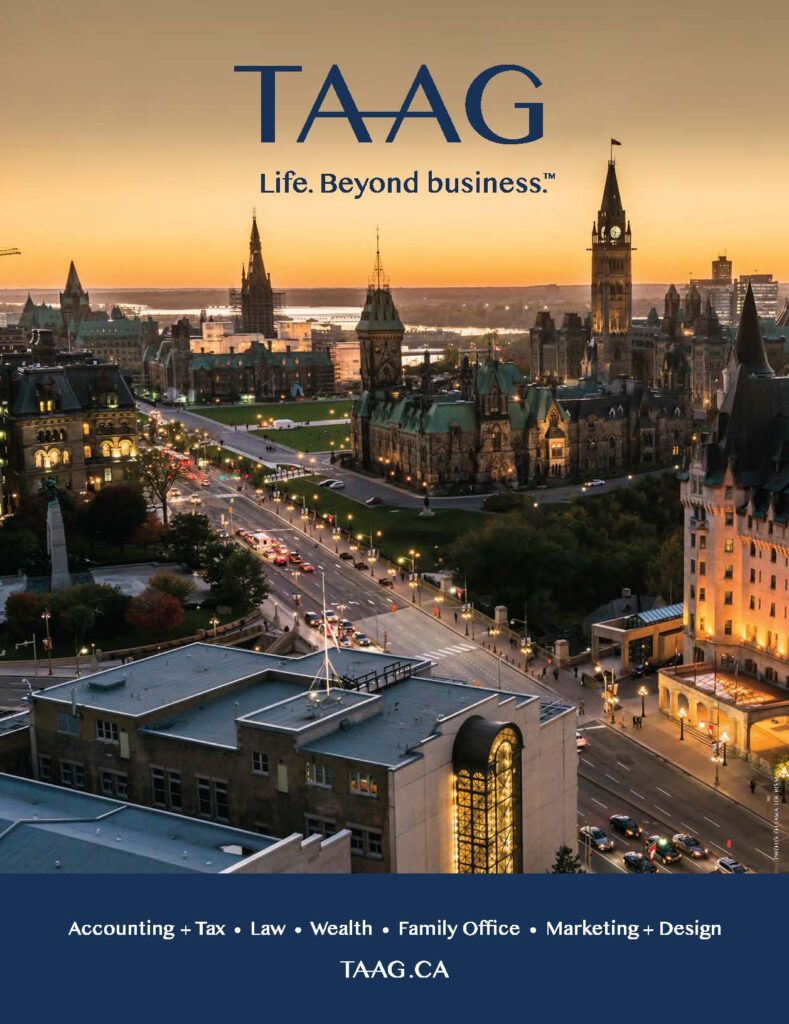Ottawa Leaders Focus on Collaboration and Future Thinking

View of Byward Market from Copper Spirits and Sights. Photo Credit: Ottawa Tourism
BY JEFF BUCKSTEIN
Quality leadership has fueled Ottawa’s success in building a diverse, multi-faceted economy that excels in many key Canadian sectors, including the public service, technology, the services industry, and academia, among others.
A highly educated base of local professionals bring “bench strength to research and innovation solutions to meet their respective sector challenges,” says Catherine Callary, vice-president of Destination Development at Ottawa Tourism.
Ottawa’s position as Canada’s capital city and seat of the federal government perpetuates co-operation between public and private sector leaders. Furthermore, “we see an incredible diversity of international companies that are headquartered here or have satellites here, that bring together their top thought leaders in Ottawa. That’s a tourism opportunity, but it’s also an opportunity to build innovation,” says Callary.
Stéphane Brutus, dean and executive director of the University of Ottawa’s Telfer School of Management, believes Ottawa is just the right size for leaders to connect and learn from each other.
“Ottawa is in that sweet spot of business activity, combined with having a very human sized town, which allows people to make these connections, to try things out, and to bounce ideas off each other,” he elaborates.
He lauds the successful leadership and work of Invest Ottawa, which is the lead economic development agency for knowledge-based local industries. “Invest Ottawa is extremely present. It plays its role in terms of promoting new businesses and growth in Ottawa in a superb fashion,” praises Brutus.
Travel leadership seeks spin-off benefit
The travel industry in Ottawa. the city’s third largest, was among the hardest hit by the pandemic. “It’s essential to have in-person interactions for tourism. That’s how people build memories,” says Callary, who notes that her industry, which pre-COVID employed more than 43,000 people, subsequently shrunk by about 25 per cent.
Facing the challenge of having to rebuild in the midst of a labour shortage, the industry is also trying to help rebuild other elements of the local economy. Ottawa Tourism has undertaken initiatives with other local leaders in an effort to provide new reasons for people to come downtown and support local businesses and engage in downtown events.
Kelly Haussler, director of Destination Development at Ottawa Tourism, says Ottawa Tourism has partnered with the Shaw Centre and Invest Ottawa on ‘Think Ottawa,’ a project designed to attract conferences and events to come to Ottawa.
Haussler says Ottawa Tourism is also creating a Destination Stewardship Plan to help define a ten year tourism vision for Ottawa. This includes strategizing on how to work collectively with local partners in order to achieve community prosperity through tourism.
For example, “Indigenous tourism is an area that we definitely want to continue to grow,” says Haussler.
Inclusivity and diversity are key aspects of the Ottawa brand. As a national capital “we want all who visit and live here to feel welcome and able to contribute meaningfully to community life,” says Callary.
The quality of life in Ottawa, plus the very cosmopolitan nature of the city, attracts people from all over the world to study, work and live. “It speaks to our strength because it allows people to see themselves mirrored in the community, and it perpetuates the invitation to want to come and to settle here,” says Claude Brulé, president and chief executive officer of Algonquin College.
For its part, Algonquin College has developed an ‘equity diversity inclusion’ blueprint to create a very inclusive environment at the college, says Brulé.
Investing in tomorrow’s leaders
The presence of several excellent post-secondary institutions helps to ensure that tomorrow’s local leaders are being prepared for the roles they will need to fill.
Algonquin College is in the thick of offering local research and innovation opportunities with very hands-on, applied research. “We help companies, especially small to medium enterprises that may not necessarily have the talent, equipment or the wherewithal to pursue their innovation agenda. We’re able to bring our students and our faculty to help them innovate, improve their prototypes, and improve their processes on the way to commercialization,” Brulé explains.
“It’s great for our students. They get to work with employers and learn about the new technologies. Often they get employed by the employers after graduation, contributing to their talent pool. And the companies benefit from the resulting R&D,” he says.
Brulé adds that there are also many examples of leadership and entrepreneurial success, where students have developed something for which they been able to retain intellectual property.
Algonquin also develops its own staff and students in leadership roles. “We have our own leadership program at the College,
which includes having made a large investment in professional development and learning. Some of it is formal. Some of it is as a result of taking part in projects and task forces and committees,” explains Brulé.
“Algonquin College is proud to be a great community builder in Ottawa. We’re delighted with what we’re able to do to help contribute to the future prosperity of the National Capital Region and the Ottawa Valley with our talent development and our leadership,” says Brulé.
“We’re grateful for the relationships that we’re able to develop with the community. We do this by ensuring that our students are able to be placed in a variety of settings with employers, including with not-for-profit companies and non-governmental agencies, so they can see leadership in action for themselves,” he explains.
Ottawa is the right size for Telfer’s business students to really flourish, says Brutus.
“Telfer is all about learning from experiences, and the proximity to organizations facilitates the integration of meaningful class projects, co-op placements, guest speakers’ engagement, etc.” he says.
Telfer is providing leadership to invest in the future through a new strategic plan that defines four major pillars, says Brutus.
One is to help generate and maintain wealth through, for example, teaching and research that places an emphasis on entrepreneurship, including a world-class centre that looks at family businesses.
Second is promoting a greener Canada, with respect to sustainability and environmental, social, and governance (ESG) principles, looking at issues such as how to transition from a carbon-based economy to other forms of renewable energy. For example, “we just revised our MBA program, which is based on the responsible manager, on a greener way of doing business,” Brutus says.
Third is working towards a happier Canada through an emphasis on issues such as mental health. “We have a core of researchers and psychologists who focus on how we can better understand and facilitate the well-being of people at work. We’re launching a multi-million dollar lab next semester that’s going to focus on these questions,” explains Brutus.
The fourth pillar is the promotion of a healthier Canada. Telfer’s focus on health is a very distinctive focus for a business school with more than a dozen healthcare management researchers and four programs dedicated specifically to health care management, says Brutus, who notes that the pandemic brought to the fore serious organizational, logistical and human resource issues in health care.
More than ever, these issues highlight the importance of sound and innovative management in this industry, he stresses.
Ambitious goals require quality leadership
As Ottawa continues to grow and enhance its reputation as a world-class city, the quality of its leadership will assume even greater importance.
Brutus notes the ambitious goals on tap for the revitalization of downtown Ottawa in the near future, including the new Civic Campus of the Ottawa Hospital, the University of Ottawa’s Advanced Medical Research Centre, the new Lansdowne 2.0 development, and expansion of light rail transit.
“The city is on the move with very aggressive plans. The challenge for leadership is how to manage that growth. How do you reinvent the city for its next big phase of development, knowing that the projection for Ottawa is one of exponential growth?” he says.




